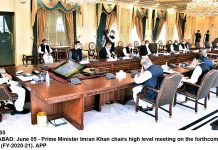HONG KONG: Former prime minister Shaukat Aziz has said that an incomplete statistics showed that China Pakistan Economic Corridor (CPEC) projects under construction have employed more than 6,000 Pakistani workers by the end of March, not to mention the employment indirectly created and driven by the projects.
Shaukat Aziz, an economist who served as prime minister of Pakistan from 2004 to 2007, made these comments on the sidelines of the “Belt and Road Summit-Financing Through Silk Road Bond”, held in Hong Kong.
The host of projects focusing on energy and transport infrastructure has been launched in Pakistan under CPEC, which Aziz said would lead to job creation in both
the countries.
“People having jobs and getting income from economic activities is where prosperity and development lies,” he said in an exclusive interview with Xinhua news agency on Thursday.
The projects under CPEC would generate more employment and growth opportunities for China, as it gives Chinese enterprises a market of some 200 million people. “That’s why we call it a win-win for both,” he said.
The excitement over CPEC in Pakistan was because of power projects initiated by China, which Aziz said would significantly ease the power shortage in Pakistan.
At least 16 projects have been sorted out in the energy sector to be implemented first, which can generate 10.4 million kilowatts of electricity in total, said Chinese Ambassador to Pakistan, Sun Weidong during an interview with Xinhua in June.
A solar power plant in the city of Bahawalpur, built by Chinese company ZTE Energy, has recently installed a 300-megawatt generator unit, which can produce electricity enough for the daily power consumption of at least 200,000 Pakistani families, the ambassador said.
The ‘Belt and Road Initiative’ will take China-Pakistan relationship to the next level, he added.
“Our relationship with China is deep, historic and multi-faceted, and increasing physical linkages will further enrich the relationship,” he said.
The former prime minister said the Belt and Road Initiative was a driver for growth, prosperity, peace and better understanding between nations in the entire world. The connectivity brought by the initiative would create linkages and interdependency between regions and countries, which is a great driver of peace, he said.
“If economies get a little more linked, I believe you will see improvement of the peace paradigm and people will find more positive approaches from countries in the region,” he added. According to Aziz, the connectivity is also a driver of economic growth, as it leads to more trade and travel that would create economic activities.
“Once you do that, there is a common interest for both sides to do well, as you depend on your neighbour and your neighbour depends on you, which would lead to better understanding, and it would also lead to peace in the region,” he said.













